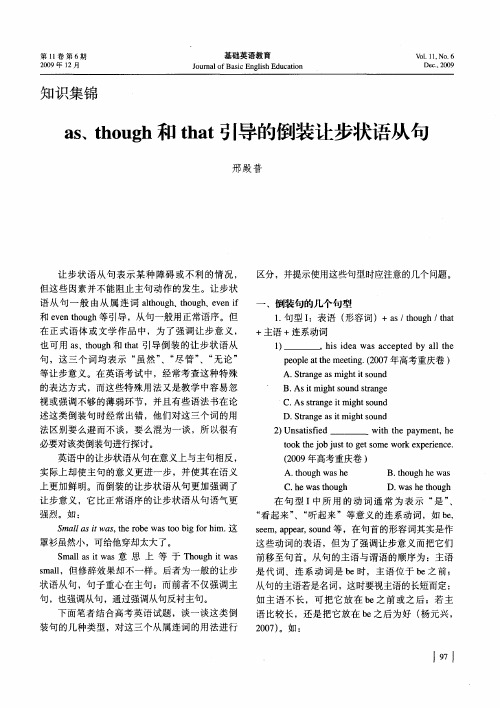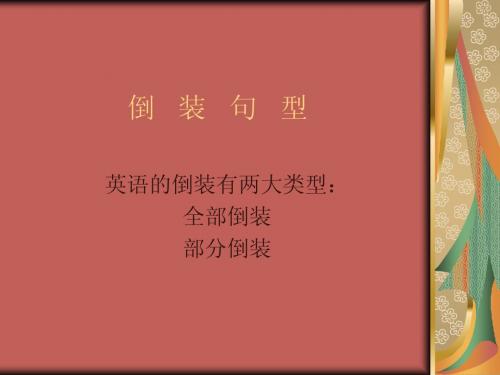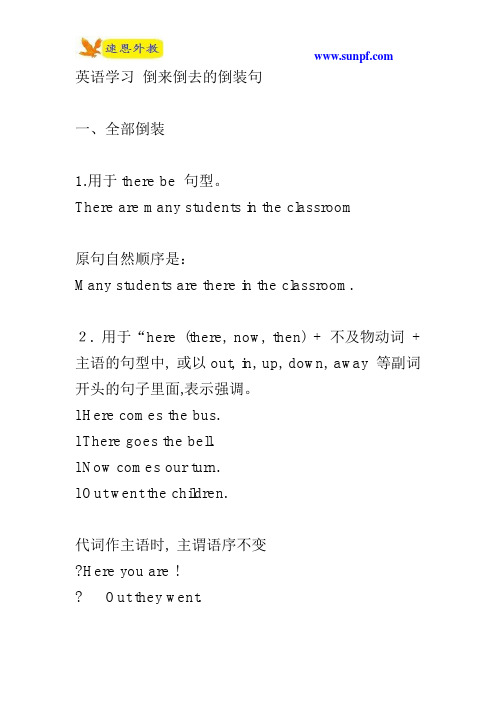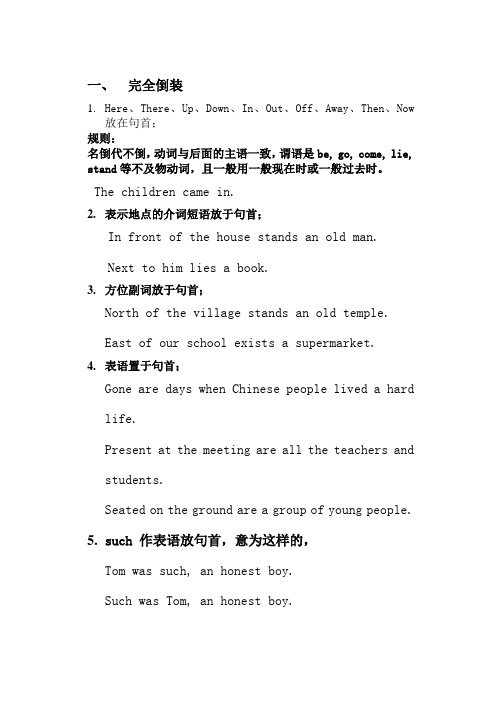倒 装
- 格式:docx
- 大小:21.17 KB
- 文档页数:5

倒装全倒练习题一. 简单句倒装1. Only when the rain stopped did we decide to go outside.2. Under the tree stood a lonely man, lost in his thoughts.3. Not until the final whistle blew did the team realize they had won the match.4. Into the room walked a cat, its eyes shining in the darkness.5. Hardly had she entered the room when the phone began to ring.二. 副词位于句首的倒装1. Never have I seen such a beautiful sunset.2. Rarely does he express his true feelings.3. Little did they know about the hidden dangers lying ahead.4. Seldom have I tasted a dish as delicious as this one.5. Nowhere else in the world can you find such breathtaking scenery.三. 含有否定词的倒装1. Not only did the movie receive critical acclaim, but it also broke box office records.2. At no point during the conversation did he mention his plans for the future.3. In no way can I accept your proposal.4. Under no circumstances should you give up on your dreams.5. By no means should you underestimate the power of hard work.四. 介词短语位于句首的倒装1. In front of the statue stood a crowd of excited onlookers.2. On top of the mountain hung a dense fog, obscuring the view.3. Behind the door hid a treasure trove of ancient artifacts.4. Beneath the surface lies a whole new world waiting to be discovered.5. In the middle of the chaos emerged a leader, guiding everyone to safety.五. 宾语位于句首的倒装1. A new car she bought, the envy of all her friends.2. An old man he met on the street, John helped carry his heavy bags.3. Several languages she speaks fluently, including French, German, and Spanish.4. The book I lent you, have you finished reading it?5. A difficult decision she had to make, weighing the pros and cons carefully.六. 条件句倒装1. Should you need any further assistance, please do not hesitate to contact us.2. Were it not for your help, I would have failed the test.3. Had I known the truth, I would have acted differently.4. Should you arrive late, you will not be admitted to the concert.5. Were it not for the storm, we would have gone on a picnic.总结:倒装结构在英语中常常用来强调、判断、修辞等。

倒装句倒装句一般分为两大类,第一类:全倒,把整个谓语动词全都放在主语前,eg:Here comes the bus.第二类:部分倒装:指把助动词或情态动词放在主语前。
完全倒装一、全倒:1、地点副词here/them方位副词up/done/in/out/ahead/away/off/back/above等位于句首,如果其后还跟有come/go/follow/arise(出现产生)/be动词,其后主语如果是名次,则全倒,主语是代词不倒。
eg:Here you are(不到装)eg:Here comes the bus=The bus is coming.There goes the bell=there bell is ringing 这种倒装句不用进行时态。
2、时间副词now/then位于句首,如果其后跟有go/come/Hollow/arise/be动词、完全倒装eg:Now comes your turn(主语) to speak(后置定词)3、A boy sat at the gate=A he the gate sat a boy.在原句中作不及物动词状语的地点介词短语位于句首,全倒4、在原句中作表语的形容词及短语或分词及短语位于句首全倒。
My home is next to (adj短语) the school=Next the school is my home5、long live+名词+!意为......万岁......万寿无疆Long live the great people!伟大的人民万岁!(The great people live long.)6、such adj./代词作为代词表示这样的人这样的事或这样的一些人、一些事。
The result is such 结果就是这样的。
做表语的such 更习惯放在句首,形成倒装。
eg:Such is the result 此时be动词单复数取决于后面的名词。



英语学习倒来倒去的倒装句一、全部倒装1.用于there be 句型。
There are many students in the classroom原句自然顺序是:Many students are there in the classroom.2. 用于“here (there, now, then) + 不及物动词+ 主语的句型中, 或以out, in, up, down, away 等副词开头的句子里面,表示强调。
l Here comes the bus.l There goes the bell.l Now comes our turn.l Out went the children.代词作主语时, 主谓语序不变?Here you are !? Out they went.3. 当句首状语是表示地点的介词词组时,也常引起全部倒装。
?From the valley came a frightening sound.? Under the tree stands a little boy.4. 为了保持句子结构平衡,或为了强调表语或状语,或为了使上下文结构紧凑。
Present at the meeting was Miss Li.强调表语They arrived at a farmhouse, in front of which sat a boy.强调状语Inside the pyramids are the burial rooms for the kings and queens and long passages to these rooms.为了上下文结构紧凑二、部分倒装1. 用于only开头的句子(修饰副词、介词短语或状语从句)Only in this way can you learn English well.2. 用于never, hardly, seldom, little, at no time, notonly, rarely, little, not a bit 等否定词开头的句子里。

一、完全倒装1.Here、There、Up、Down、In、Out、Off、Away、Then、Now放在句首;规则:名倒代不倒,动词与后面的主语一致,谓语是be, go, come, lie, stand等不及物动词,且一般用一般现在时或一般过去时。
The children came in.2.表示地点的介词短语放于句首;In front of the house stands an old man.Next to him lies a book.3.方位副词放于句首;North of the village stands an old temple.East of our school exists a supermarket.4.表语置于句首;Gone are days when Chinese people lived a hard life.Present at the meeting are all the teachers and students.Seated on the ground are a group of young people.5.such 作表语放句首,意为这样的,Tom was such, an honest boy.Such was Tom, an honest boy.二、部分倒装1.表示否定意义的词或短语放在句首,句子要部分倒装,如never, seldom , little, not, hardly (…when), no sooner (…than), by no means, at no time, in no case, in no way(绝不)等。
N ever/ seldom / little…+系动词/助动词/情态+主语Never have we seen such an attractive school! Seldom do I go to school by bus.Little do I know about you.At no time will we give up.2. Hardly had the baby cried when his mother rushed to carry him.Hardly had they reached home when it rained heavily.No sooner had I sat down than the phone rang. Hardly had+ 主语+done+_______从句(一般过去时)No sooner had+ 主语+done+______从句(一般过去时)3. Not only … but also …引导两个并列分句,not only 置于句首,前倒后不倒.即not only +情\系\助 +主语+but( also)……Not only can we learn much knowledge, but also we can make many good friends here.Not only does he teach in school, but he (also) writes novels.4.Not until 位于句首时,主句要部分倒装,主倒从不倒。
倒装—、基本概念语序是句子成分在句子中排列的顺序。
正常情况下,主语立于谓浯动词的前面,表语、宾语或状语位于动词后面,定语位于所修饰的词语之前或之后。
主语和谓语有两种顺序。
主语在前称为自然语序;反之,如果谓语在主语前面,称为倒装语序(1nversion)。
倒装的形式有两种:全部倒装和部分倒装。
倒装的语义功能有两种:一是语法倒装,二是修辞倒装。
前者是出于语法上的需要,非用倒装语序不可,有强制性;后者出于达到某种修辞效果(如强调、平衡、衔接、描绘)。
二、用法(一) 全部倒装1.在以here,there或out,in,uP,down,away等副词开头的句子里,表示强调或为了表达生动。
例如:Then followed eight years Of the Anti-Japanese War.接着是八年抗日战争。
There goes the bell.铃响了。
Out rushed the children.孩子们跑了出来。
Away went the boy.—那男孩走了。
注意主语是人称代词时,主语和谓语的语序不变。
例如:Here让is.这就是。
There she comes看,她来了。
1)Seeing many people coming,away__A.the thiefran B.run the thiefC.ran the thief D.did the thiefrun2)There__shoutsforhelpfromtheriver.A.are coming B.came C.did colne D.c(3)一Look!There .——Oh,yes,there——·A.So the fishermen;So theyB·go the fishermen;they SoC.are the fishermen going;are goingD.went the fishermen;they went4)Look!There——thebus!A.will come B.conies C.has come D.is coming5上工l上I上———————————一一—————A.COlllC they D.they conicC.they are coming D.tile>·will come表示地点的介词短’语故在句首时,谓语多为Lestand,come,walk等不及物动词:例如:0n the right is a map of C1\:n2.右边是一幅中国地图。
In front OfHie lies 2\-3叭11e㈠.在我面前·是无边的田乏:6)Aaalnst the\十aU On tlc c,十‘:i泪f土,;:三nd¨‘,cu厂l,'巳r小 B/———一』‘:—一,,,—一·———一(7)Onahillinfrontofthem——agreatcastle.(stand)在他们面前的山上矗立着一座巨大的城堡。
(8)Roundthecorner——ayoungpoliceman.(walk)拐角上有个年轻的警察在走着。
(9)Underthetablewas——ablackcat.(Ue)桌子底下躺着一只黑猫。
3.用于直接引语的一部分或全部放在句首,其中间插入或后面跟着表示“某人说”这类意思的成分时。
例如:“Ol,,讣is most beautiful!”said the Minister quickly.“哦!真是美极了!”大臣连忙说。
“They must be诅the fields now,”thought Xiao Lin.“他们准是下地了。
”小林想。
(10)“Whatdoestheword mean?"——一·“这个单词是什么意思?”男孩问道。
(11)“Youshould havebeen},erefive minutesearlier,”——“你应该早来五分钟。
”老师说。
4.某些表示祝愿的句子中用倒装。
例如:Long live the People's Republic心Chihai中华人民共和国万岁!May you have a good time during the holiday!祝你假期愉快15.表语置于句首时,倒装结构为“表语+系动词+主语”(i)形容词+系动词+主语。
例如:Present at the meehng was MI’.Green校长格林出席了会议。
(正)过去分词+系动词+主语。
例如:Hidden behind the door were SOl/IC naughty children淘气的孩子们藏在门后。
6.用在thereLe的句型中。
例如:There are some books On the desk.桌上有些书。
·There were nO classes this afternoon.今天下午没有课。
There will be a football match this afternoon.今天下午有一场足球赛。
(二)部分倒装Can you do让?你能做吗?直到1918年战争结束后,他才能愉快地重新投身于研究工作。
Only then did l realize that 1 was wrong,只有在那时我才意识到自己错了。
Only in this way can you learn from your friends.只有这样你才能向你的朋友学习‘注意如果only强调的是主语部分用自然语序。
例如:Only a doctor can dO that.只有医生能做那件事。
虽然位于句首,句子仍13)Only'b)’shoutingatthetopOfhisvoice——,A.he was able to make himselfhearB.he was able tO make himself LeardC.was Le able tO make himself hearD.was he able tO make himselfheard(14)Onlythen——thatlwaswrong.只是到那个时候我才意识到我错了。
(15)Only inthis way——yourpronunciation.只有用这种方法你才能改善你的发音。
(16)Onlywhenhis hometown was liberated in t949sch001.只有在1949年他家乡解放时,他才能上学。
3.以never,hardly,not,not only',little,seldom,Onen time,not until,rarely,in vain,scarcely,hardly,nO词开头的句中常用倒装语序。
例如:Never have l seen him before我过去从来没有见过他。
Hardly did l think讣possible.我几乎认为这是不可能的。
oner等Not onlywas everythinghe had takenfromhim,but also h诅Ger man citizenship.不仅他所有的一切都被没收N荒dln001)didhestart.他到中午才出发。
而且连他的德国公民权也被剥Seldom had she been asked tO speak before such a big audience.他很少被邀请在这么多听众面前讲话。
Scarcely had she fallen asleep when a knock at the door awak—ened her.她刚要睡着,忽然敲门声把她惊醒。
NO sooner had he shut his eyes than he got a harder push in hisside.他刚一合眼,肋部就被更猛烈地推了一下。
Hardly had l reached the bus stop when the bus started.我刚到车站,公共汽车就开了。
注意上面谈到的这些词如果不放在句首,句子就不必倒装。
例如:Never shall l forget the day when Chairman Mao came tO our讥l—lage.就可以改为I shall never forget the day when Chairman Maocametoourvillage.这两种结构的差别是前者never这个状语置于更突出的位置(即句首),对它更强调一些。
(17)Little——about his own safety,though he was in greatdanger himself.A.does he care D,C.he cares D(18)Notonly——pollutedbut—A.was the city';were the streetsB.the c讣\’was;were the streetsC.was the city;the streets wereD,the city’was;the streets were(19)Notuntill begantowork——ted.did he carehe caredcrowdedA.didn't l realize B.did l realizeC.I didn't realize D.I realized(20)Notasinglemistake——inthedictationyesterday.A.did he make B.made by himC.he made D.he had made(21)NOsooner,——histalkthanhe——theworkersA.he finished;surrounded byB.did he finish:did surroundC.had he finis}led;was surrounded byD.after he fini5hed;was surrounded near(22)Hardly'——tothecinemawhenthefilmA.we got;had begun B.had we got;beganC.we had got;began D.have we got;begins在so…that…,such.,.that...句型中,若把so,such引导的结构放在句首时,主句要用部分倒装结构。